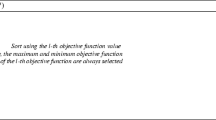Abstract
In this article we introduce a new multiobjective optimizer based on a recently proposed metaheuristic algorithm named Variable Mesh Optimization (VMO). Our proposal (multiobjective VMO, MOVMO) combines typical concepts from the multiobjective optimization arena such as Pareto dominance, density estimation and external archive storage. MOVMO also features a crossover operator between local and global optima as well as dynamic population replacement. We evaluated MOVMO using a suite of four well-known benchmark function families, and against seven state-of-the-art optimizers: NSGA-II, SPEA2, MOCell, AbYSS, SMPSO, MOEA/D and MOEA/D.DRA. The statistically validated results across the additive epsilon, spread and hypervolume quality indicators confirm that MOVMO is indeed a competitive and effective method for multiobjective optimization of numerical spaces.
Similar content being viewed by others
Notes
The parameter values for each benchmarking algorithm have been drawn from their original articles.
References
Deb, K. (2014). Multi-objective Optimization. In E. K. Burke & G. Kendall (Eds.), Search Methodologies. Introductory tutorials in optimization and decision support techniques, chap. 15 (pp. 403–449). New York: Springer Science and Business Media.
Deb, K. (2008). Introduction to Evolutionary Multiobjective Optimization. In J. Branke, K. Deb, K. Miettinen, & R. Sowiski (Eds.), Multiobjective Optimization, LNCS, chap. 3 (Vol. 5252, pp. 59–96). Berlin Heidelberg: Springer.
Deb, K., Thiele, L., Laumanns, M., Zitzler, E., Abraham, A., Jain, L., Goldberg, R. (2005). Scalable test problems for evolutionary multiobjective optimization. Evolutionary multi-objective optimization, pp. 105–145.
Deb, K., Pratap, A., Agarwal, S., & Meyarivan, T. (2002). A fast and elitist multiobjective genetic algorithm: NSGA-II. IEEE Transactions on Evolutionary Computation, 6(2), 182–197.
Derrac, J., Garca, S., Molina, D., & Herrera, F. (2011). A practical tutorial on the use of nonparametric statistical tests as a methodology for comparing evolutionary and swarm intelligence algorithms. Swarm and Evolutionary Computation, 1(1), 3–18.
Durillo, J. J., & Nebro, A. J. (2011). JMetal: A Java framework for multi-objective optimization. Advances in Engineering Software, 42(10), 760–771.
Huband, S., Barone, L., While, L., & Hingston, P. (2005). A Scalable Multi-objective Test Problem Toolkit. In C. A. Coello, A. H. Aguirre, & E. Zitzler (Eds.), Evolutionary Multi-Criterion Optimization, LNCS (Vol. 3410, pp. 280–295). Berlin Heidelberg: Springer.
Knowles, J., Thiele, L., Zitzler, E. (2006). A tutorial on the performance assessment of stochastic multiobjective optimizers. Technical Report 214.
Li, H., & Zhang, Q. (2009). Multiobjective optimization problems with complicated Pareto sets, MOEA/D and NSGA-II. IEEE Transactions on Evolutionary Computation, 13(2), 284–302.
Mezura-Montes, E., Reyes-Sierra, M., & Coello, C. (2008). Multi-objective Optimization Using Differential Evolution: A Survey of the State-of-the-Art. In U. Chakraborty (Ed.), Advances in Differential Evolution, Studies in Computational Intelligence (Vol. 143, pp. 173–196). Berlin Heidelberg: Springer.
Molina, D., Puris, A., Bello, R., Herrera, F. (2013). Variable mesh optimization for the 2013 CEC special session niching methods for multimodal optimization. In IEEE Congress on Evolutionary Computation (CEC ’13), pp. 87–94.
Navarro, R., Falcon, R., Murata, T., Hae, K.C. (2015). A generic niching framework for variable mesh optimization. In 2015 IEEE Congress on Evolutionary Computation (CEC ’15), pp. 1994–2001. Sendai, Japan.
Nebro, A.J., Durillo, J.J., Garcia-Nieto, J., Coello Coello, C.A., Luna, F., Alba, E. (2009). SMPSO: a new PSO-based metaheuristic for multi-objective optimization. In IEEE Symposium on Computational intelligence in Multi-criteria Decision-Making, 2009. mcdm ’09, pp. 66–73.
Nebro, A. J., Durillo, J. J., Luna, F., Dorronsoro, B., & Alba, E. (2009). MOCell: A cellular genetic algorithm for multiobjective optimization. International Journal of Intelligent Systems, 24(7), 726–746.
Nebro, A. J., Luna, F., Alba, E., Dorronsoro, B., Durillo, J. J., & Beham, A. (2008). AbYSS: Adapting scatter search to multiobjective optimization. IEEE Transactions on Evolutionary Computation, 12(4), 439–457.
Ono, I., Kita, H., & Kobayashi, S. (2003). A Real-coded Genetic Algorithm using the Unimodal Normal Distribution Crossover. In A. Ghosh & S. Tsutsui (Eds.), Advances in Evolutionary Computing, chap. 8 (pp. 213–237). Berlin Heidelberg: Springer.
Price, K. V., Storn, R. M., & Lampinen, J. A. (2005). Differential Evolution: A Practical Approach to Global Optimization. New York: Springer.
Puris, A., Bello, R., Molina, D., & Herrera, F. (2012). Variable mesh optimization for continuous optimization problems. Soft Computing, 16(3), 511–525.
Wolper, D. H., & Macready, W. G. (1996). No free lunch theorems for optimization. IEEE Transactions on Evolutionary Computation, 1(1), 67–82.
Zhang, Q., Liu, W., Li, H. (2009). The performance of a new version of MOEA/D on CEC’09 unconstrained MOP test instances. In IEEE Congress on Evolutionary Computation (CEC ’09), pp. 203–208.
Zhang, Q. Z. Q., & Li, H. L. H. (2007). MOEA/D: A Multiobjective Evolutionary Algorithm Based on Decomposition. IEEE Transactions on Evolutionary Computation, 11(6), 712–731.
Zhou, A., Qu, B. Y., Li, H., Zhao, S. Z., Suganthan, P. N., & Zhang, Q. (2011). Multiobjective evolutionary algorithms: A survey of the state of the art. Swarm and Evolutionary Computation, 1(1), 32–49.
Zitzler, E., Knowles, J. D., & Thiele, L. (2008). Quality assessment of pareto set approximations. In K. Branke, K. Deb, K. Miettinen, & R. Sowiski (Eds.), Multiobjective optimization: interactive and evolutionary approaches, LNCS chap. 14 (Vol. 5252, pp. 373–404). Berlin Heidelberg: Springer.
Zitzler, E., Thiele, L., Laumanns, M., Fonseca, C. M., & da Fonseca, V. G. (2003). Performance assessment of multiobjective optimizers: an analysis and review. IEEE Transactions on Evolutionary Computation, 7(2), 117–132.
Zitzler Eckart, L.M.T.L. (2001). Spea2: improving the strength pareto evolutionary algorithm for multiobjective optimization. Evolutionary methods for design optimization and control with applications to industrial problems, pp. 95–100.
Zitzler, E., Deb, K., & Thiele, L. (2000). Comparison of Multiobjective Evolutionary Algorithms: Empirical Results. Evolutionary Computation, 8(2), 173–195.
Acknowledgments
This work was funded by the eureka SD project (agreement number 2013-2591), that is supported by the Erasmus Mundus programme of the European Union.
Author information
Authors and Affiliations
Corresponding author
Rights and permissions
About this article
Cite this article
Salgueiro, Y., Toro, J.L., Bello, R. et al. Multiobjective variable mesh optimization. Ann Oper Res 258, 869–893 (2017). https://doi.org/10.1007/s10479-016-2221-5
Published:
Issue Date:
DOI: https://doi.org/10.1007/s10479-016-2221-5




